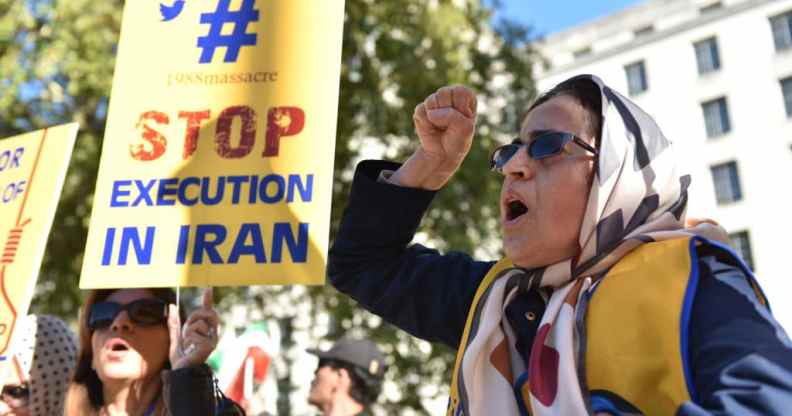11 countries where LGBTQ+ people still face death penalty

Protesters in London against the death penalty in Iran. (John Keeble/Getty)
A year after a number of leading LGBTQ+ organisations called on 11 countries to end the threat of the death penalty as a punishment for queer people, nothing has changed.
In 2022, ILGA Asia, the International Commission of Jurists (ICJ) and five other organisations condemned the use of violence against LGBTQ+ people in a statement issued to mark International Day Against Homophobia, Biphobia and Transphobia (IDAHOBIT).
In the statement, the LGBTQ+ organisations noted that 70 countries around the world continued to criminalise same-sex sexual conduct, including 22 Asian countries.
ILGA Asia said 11 countries – Afghanistan, Brunei, Darussalam, Iran, Mauritania, Nigeria, Pakistan, Qatar, Saudi Arabia, Somalia, the United Arab Emirates and Yemen – retain the death penalty for LGBTQ+ people. Eight of those countries are in Asia.
According to Human Dignity Trust, the death penalty is implemented in Iran, Northern Nigeria, Saudi Arabia, Somalia and Yemen, and remains a “legal possibility” in Afghanistan, Brunei, Mauritania, Pakistan, Qatar and UAE.
A year later, as IDAHOBIT is marked again on 17 May, there are now just 66 countries in the world that criminalise private, consensual same-sex activity – but the number using the the death penalty as punishment remains firm, at 11.
Imposing death penalty for LGBTQ+ people violates ‘right to life’
Anti-LGBTQ+ laws and capital punishment disproportionately affect ethnic or religious minorities and those from disadvantaged socio-economic backgrounds, the organisations said.
“The retention and imposition of the death penalty for consensual, same-sex sexual conduct is a violation of the right to life and of the right to freedom from cruel, inhuman and degrading treatment or punishment,” said Daron Tan, associate international legal adviser at the ICJ.
Tan said such laws breach numerous human rights, and they may also cause people to be denied access to healthcare systems.
Ajita Banerjie, research officer at ILGA Asia, called for same-sex sexual conduct to be decriminalised across the world, and said the death penalty should be abolished in all circumstances.
“Further, we urge authorities in all the countries that continue to retain the death penalty to introduce a moratorium on its use, as a necessary first step towards the abolition of the death penalty.
“Lastly, we call on the authorities to ensure that all necessary safeguards are in place in order to ensure access to legal representation and fair trials for those currently facing the death penalty in connection with their real or purported engagement in consensual same-sex sexual conduct.”
The United Nations and other human rights organisations have repeatedly condemned the use of the death penalty in numerous countries around the world.
In December 2020, the UN general assembly called on states that still use the death penalty to ensure it’s not being applied “on the basis of discriminatory laws or as a result of discriminatory or arbitrary application of the law”.
Two gay men were executed in Iran in January 2022
Even in countries where the death penalty is not used against LGBTQ+ people, many continue to face arrest and conviction for having consensual sex.
Some countries maintain arbitrary “immorality” laws which target members of the LGBTQ+ community, including Kuwait, Lebanon, Myanmar and Oman.
There was widespread uproar in January 2022 when a human rights network said that two gay men had been executed in Iran after spending six years on death row.
The two men, who were named as Mehrdad Karimpour and Farid Mohammadi by the Human Rights Activists news agency, had been sentenced to death for “forced sexual intercourse between two men”.
In July 2022, another gay man was executed in Iran under a “sodomy” charge, according to human rights groups.
Another two men were reportedly executed on similar charges in Iran in July 2021.

